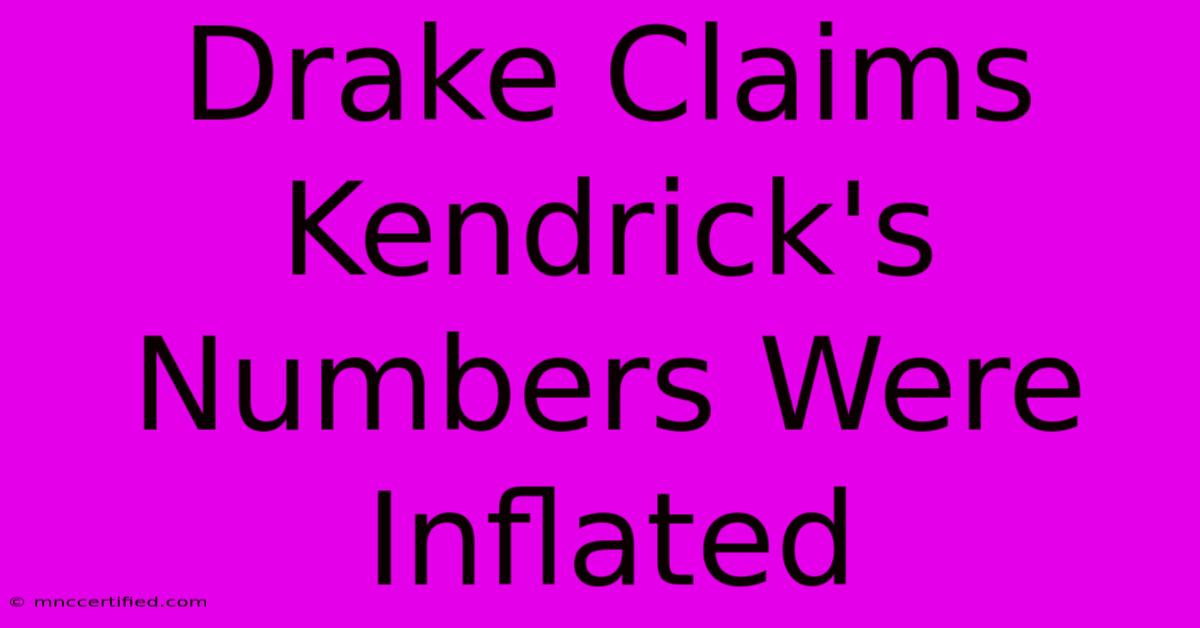Drake Claims Kendrick's Numbers Were Inflated

Table of Contents
Drake Claims Kendrick Lamar's Numbers Were Inflated: Fact or Fiction?
The hip-hop world is abuzz with speculation following claims that Drake suggested Kendrick Lamar's streaming numbers were inflated. This isn't the first time accusations of streaming manipulation have surfaced in the music industry, and it certainly won't be the last. But the alleged source – Drake himself – adds a significant layer of intrigue and controversy. Let's delve into the details, exploring the evidence (or lack thereof), the implications, and the broader context of streaming data manipulation in the music industry.
The Alleged Accusation: What Did Drake Say?
The specifics of Drake's alleged statement remain somewhat shrouded in mystery. There's no readily available official recording or transcript. The information has spread primarily through social media and online forums, fueled by anonymous sources and second-hand accounts. This lack of concrete evidence makes it difficult to definitively verify the claim. The core allegation, however, centers around Drake suggesting that Kendrick Lamar's impressive streaming numbers were artificially boosted. This implies a deliberate attempt to inflate the perceived success of Lamar's latest release.
The Importance of Streaming Numbers in the Music Industry
Before we dissect the Drake-Kendrick situation, let's understand the crucial role streaming numbers play in the modern music landscape. Streaming metrics are increasingly important for:
- Chart performance: Streaming data heavily influences major music charts like Billboard, impacting an artist's overall ranking and visibility.
- Financial success: Royalties and streaming revenue are directly linked to the number of streams an artist generates.
- Brand deals and endorsements: High streaming numbers often attract lucrative brand partnerships.
- Overall artist perception: In the eyes of many, high streaming counts equate to significant success and influence.
Therefore, any allegations of manipulation carry serious consequences, potentially affecting an artist's reputation, income, and future opportunities.
Analyzing the Claims: Evidence and Counterarguments
The absence of direct evidence supporting Drake's claims makes it challenging to assess their validity. We need to consider several crucial points:
- Lack of concrete proof: The lack of verifiable sources makes it difficult to confirm whether Drake actually made these statements. Was it a joke taken out of context? A private conversation leaked? The uncertainty is key.
- Industry-wide concerns: While Drake's alleged comments target Kendrick Lamar, concerns about streaming manipulation are widespread within the music industry. Many artists have expressed skepticism about the accuracy and transparency of streaming data.
- Potential motivations: What might motivate someone to make such accusations? Is it a rivalry between artists, a strategic move to deflect attention, or something else entirely? The motive remains unclear.
The Broader Context: Streaming Data Manipulation
The music industry grapples with the issue of streaming manipulation on multiple levels:
- Bot farms: Automated systems can generate artificial streams, inflating an artist's numbers.
- Paid promotions: Some artists or labels might pay for streams, artificially boosting their chart positions.
- Data inconsistencies: Variances between different platforms and reporting methods can lead to inaccuracies and confusion.
These concerns necessitate a more transparent and accountable system for tracking and verifying streaming data.
Conclusion: Uncertainties Remain
The claim that Drake questioned Kendrick Lamar's streaming numbers remains largely unverified. While the lack of solid evidence prevents a definitive conclusion, the discussion highlights the critical importance of accuracy and transparency in the music industry's streaming metrics. Until concrete evidence emerges, the speculation will continue to fuel debate among fans and industry insiders alike. The conversation, however, is crucial to fostering a more honest and equitable system for evaluating musical success. Further investigation is needed to uncover the truth behind this intriguing, and potentially damaging, allegation.

Thank you for visiting our website wich cover about Drake Claims Kendrick's Numbers Were Inflated. We hope the information provided has been useful to you. Feel free to contact us if you have any questions or need further assistance. See you next time and dont miss to bookmark.
Featured Posts
-
Hannah Kobayashis Father Death Near Lax Airport
Nov 26, 2024
-
Suttons Celtic Rangers Quip On Keane Viral
Nov 26, 2024
-
Newcastle 0 2 West Ham Game Recap
Nov 26, 2024
-
Bond Arms Rowdy 45 410 Holster
Nov 26, 2024
-
Lithuania Dhl Cargo Plane Crash Fatality
Nov 26, 2024